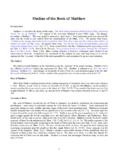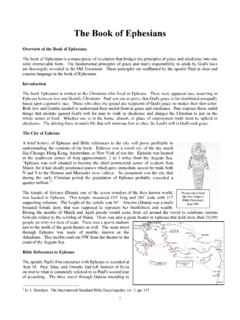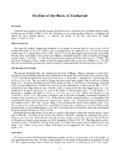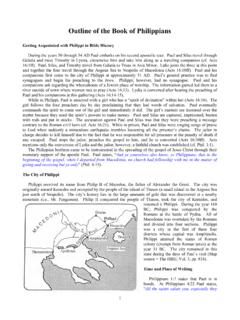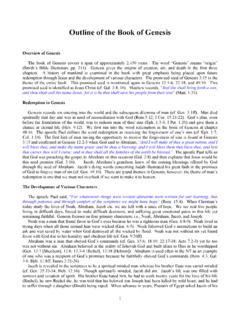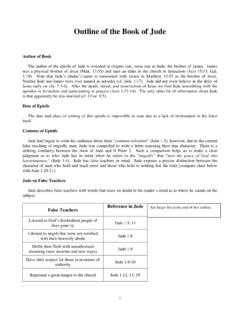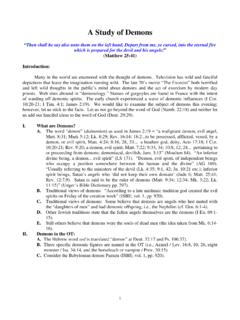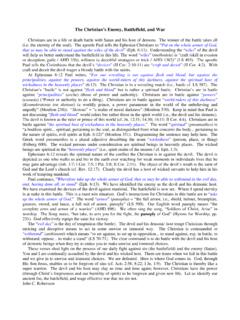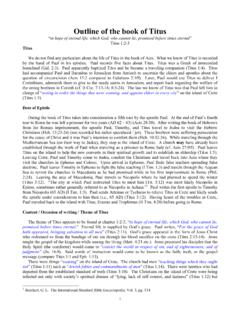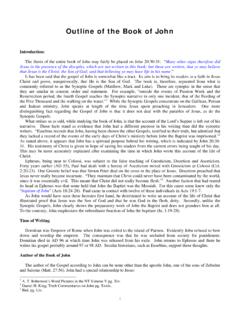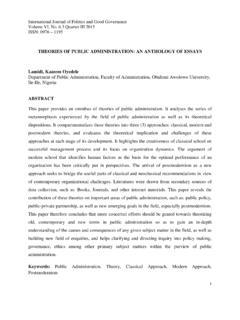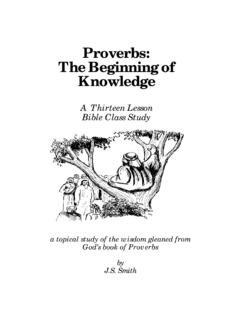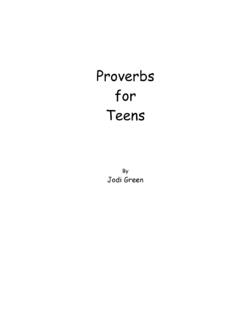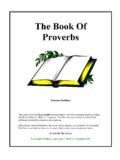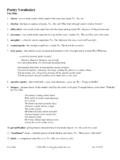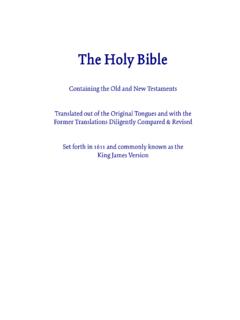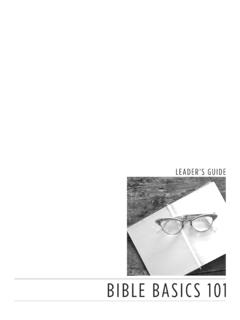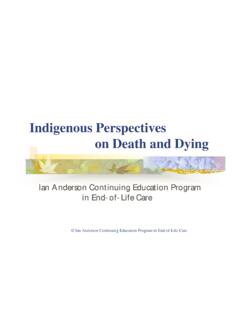Transcription of Outline of Proverbs
1 1 The Book of Proverbs Introduction: The very first word found in Proverbs is the Hebrew word masal. The Hebrew word masal is translated Proverbs in the 1901 ASV and is defined as byword, saying, a saying, usually brief, stating observations from experience so arrestingly that it gains popularity. The purpose is to warn against dangerous conduct, while encouraging behavior that promotes personal and social well-being" (International Standard Bible Encyclopedia vol. 3 page 1012). The very purpose of this book is given in the first six verses of chapter one. Attaining wisdom and understanding through the process of instruction and prudence ought to be man's primary objective. The Proverbs of this book belonged to Solomon ( Proverbs 1:1). Solomon was known for his wisdom (1 Kings 4:29). The Bible tells us that Solomon had composed 3000 Proverbs (1 Kings 4:32).
2 Other authors were Agur ( Proverbs 30:1) and Lemuel's mother ( Proverbs 31:1). Date The date of compilation of Proverbs into book form can be no earlier than the reign of Hezekiah (715 690 BC). Proverbs 25:1 states, These also are Proverbs of Solomon, which the men of Hezekiah king of Judah copied out. Content of Proverbs The theme of Proverbs is found at chapter 1:7 and 4:7. Solomon writes, "The fear of Jehovah is the beginning of knowledge ; but the foolish despise wisdom and instruction" ( Proverbs 1:7). Again, he writes, "Wisdom is the principle thing; therefore get wisdom; yea, with all thy getting get understanding" ( Proverbs 4:7). That which is to be first, highest, and foremost in a person's life is obtaining wisdom. Solomon depicts wisdom as the greatest treasure a man may own (see Proverbs 8:18-19; 16:16; 20:15). When one comes to view wisdom with such precedence in life they will do all they can do to obtain it as though it were a precious treasure.
3 Solomon wrote, "Buy the truth and sell it not; yea, wisdom, and instruction, and understanding" ( Proverbs 23:23). Parents often contemplate how they may instill faith, conviction, and the pursuit of wisdom within their children. Solomon tells us that the way to instill these eternal characteristics within man is to help them understand the great value of wisdom. Jesus said, "The kingdom of heaven is like unto a treasure hidden in the field; which a man found, and hid; and in his joy he goes and sells all that he hath, and buys that field" (Matthew 13:44-45). Solomon spends a considerable amount of time defining wisdom in the book. Solomon writes, "I wisdom have made prudence my dwelling, and find out knowledge and discretion" ( Proverbs 8:12). Wisdom is identified as prudence, knowledge , and discretion. The word prudence "expresses caution and wisdom in the conduct of implies not only caution but the capacity for judging in advance the probable results of one's actions" (American Heritage Dictionary {hereafter AHD} 998).
4 "Discretion" is "to be having or showing a judicious reserve in one's speech or behavior; lacking ostentation or pretension; modest" (AHD 403). " knowledge " is "familiarity, awareness, or understanding gained through experience or the sum or range of what has been perceived, discovered, or learned" (AHD 705). Wisdom is the ability to gain understanding of life issues and to exercise reserve due to a perception of probable outcomes. knowledge , prudence, and discretion will keep man out of much trouble in life and bring a great deal of happiness now and forevermore. The book of Proverbs paints pictures of various topics that wisdom affects. The book focuses heavily upon the consequences of man's choices in this life. Proverbs reveals the grave consequences for rejecting wisdom in life. Solomon writes, "Good understanding giveth favor; But the way of the transgressor is hard" ( Proverbs 13:15).
5 The life of the fool is likened unto making your way through a "hedge of thorns" ( Proverbs 15:19). When a person rejects wisdom for foolishness they bring trouble ( Proverbs 15:6; 21:23), destruction ( Proverbs 13:13), mischief ( Proverbs 28:14), and calamity ( Proverbs 22:) to their lives and the lives of those they touch. The foolish experience 2trouble, destruction, mischief, and calamity in life because of the poor decisions they make. The fool will have evil companions ( Proverbs 1:10-14; 4:14-19; 13:20; 20:19; 24:1-2; 28:9), participate in sexual immorality ( Proverbs 5:7-9; 9:14-15; etc.), be too lazy to work ( Proverbs 6:6-11; etc.), use filthy language ( Proverbs 4:24-27; 8:7-9), hunger and thirst for riches ( Proverbs 11:4-6, 27-28; 13:7-8, 11; 18:11, 23; 23:4-5; etc.), angry ( Proverbs 19:19; 29:11), bear false witness ( Proverbs 19:5, 28; 25:18), seek revenge ( Proverbs 20:22), scoff at others ( Proverbs 21:24; 22:10; 24:9; 29:8), and harden their hearts against God's laws ( Proverbs 29:1).
6 All such foolishness brings regret, troubles, and sorrows now and forevermore. Proverbs paints a picture of the great contrast between the life of the wicked and the wise. While the wicked wallow in poverty and trouble the wise enjoy life now and forevermore. The choice of pursuing wisdom in life results in preserving the soul ( Proverbs 16:17), longevity of life ( Proverbs 9:11), happiness ( Proverbs 17:22; 28:14; 29:18), satisfaction ( Proverbs 19:23), riches, honor, and life ( Proverbs 22:4, 29), and such a one is less likely to experience troubles ( Proverbs 19:23; 21:23). The wise will avoid worldliness at all cost. Solomon writes, "Keep thy heart with all diligence; For out of it are the issues of life" ( Proverbs 4:23 see also 25:26). The wise man also maintains a proper attitude toward sin. Solomon writes, "The fear of Jehovah is to hate evil: Pride, and arrogancy, and the evil way, and the perverse mouth, do I hate" ( Proverbs 8:13 see also 8:7-9; 13:5; 14:9).
7 The wise have a high estimation of their soul. "He that gets wisdom loves his own soul: He that keeps understanding shall find good" ( Proverbs 19:8 etc.). The wise are humble ( Proverbs 20:9; 22:4; 29:23; 28:13), interested in spiritual matters ( Proverbs 23:12, 26), seek out the things that delight God ( Proverbs 11:1, 20; 12:2-3 etc.), and have a never quit attitude. Solomon writes, "If thou faint in the day of adversity, Thy strength is small" ( Proverbs 24:10). The overall message of Proverbs is that when one chooses the way of wisdom they chose a good life. Truly it is a wonderful life being a Christian. Such a life is enjoyable now and will be forevermore! Chapter One I. The purpose of the Proverbs (1:1-6): A. The Proverbs of Solomon the son of David, king of Israel (1:1). 1. As stated in the introduction, a proverb is a maxim (truisms), comparison, noting likenesses in things unlike. 2. The book begins by identifying its author; , Solomon the son of king David.
8 B. To know wisdom and instruction; to discern the words of understanding (1:2). 1. By the examination of comparisons or parallels through instruction one gains understanding and wisdom. 2. The one who engages in the pursuit of wisdom through Proverbs sharpens his understanding in matters of riddles, enigmas, and dark sayings (cf. Prov. 1:6). The sharpening of one's understanding is "discernment" ( , the ability to differentiate or distinguish between things). The wise will differentiate between right and wrong. C. To receive instruction in wise dealing, in righteousness and justice and equity (1:3). 1. The Proverbs of Solomon deal in wisdom, instruction, and discernment. The wise will "receive" and the foolish shall reject "instruction." 2. The instruction is in "righteousness" and therefore forms the thinking in a right direction. The instruction is in "justice" and therefore helps us form just judgments upon not only ourselves but our fellow man.
9 The instruction is in "equity" and therefore teaches the wise to be fair and impartial in judgments. Let all look to the facts alongside the word of God for proper judgments and not allow emotionalism to cloud one s judgment (see study # 1; Bible Authority). D. To give prudence to the simple, to the young man knowledge and discretion: (1:4). 1. The word simple is defined as the foolish, silly, one who allows him self to be easily persuaded or led astray. 1 The word simple is found 18 times in Proverbs and six other times in the entire Bible. 1 Keil and Delitzsch pg. 40 32. Prudence (phronesis) = a minding to do so and so, purpose, thoughtfulness, prudence (LS 872). The American Heritage Dictionary defines the word as, careful the capacity for judging in advance the probable results of one's actions (AHD 998). The prudent is cautious and careful in all his dealings.
10 The simple are easily carried away with every wind of doctrine (Cf. Rom. 16:18-19). The Proverbs are therefore designed to sharpen the mind of the simple through knowledge and discretion. The young man who gains wisdom will be careful and cautious when any teaching is brought his way. He will be cautious and careful when making a decision to do this or that. E. The word that always indicates purpose. Solomon records that the purpose of a proverb is that the wise man may hear, and increase in learning; and that the man of understanding may attain unto sound counsels (1:5). 1. Godliness is an education process (Cf. Isa. 54:13; Jn. 6:44; Eph. 4:20-22). 2. Understanding through education leads one to attain unto sound counsels. To explain, to make to understand: one who is caused to understand or who lets himself be informed, and thus an intelligent person that is one who may gain by means of these Proverbs .
